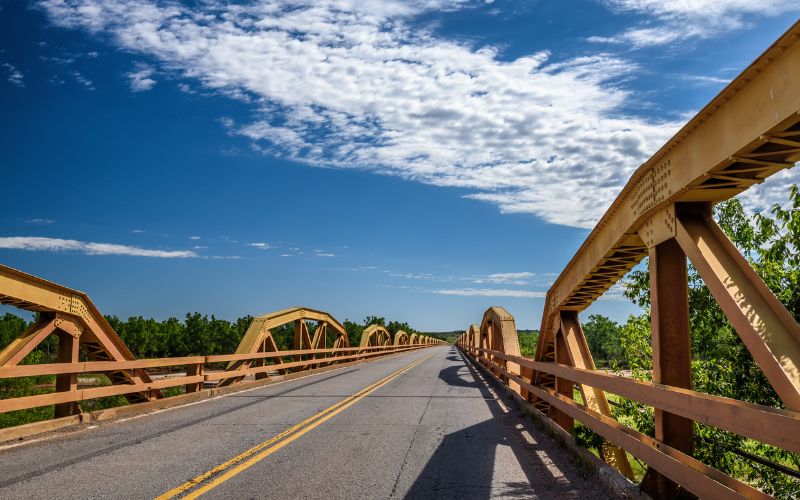
- Details
- By Native News Online Staff
Two federally recognized tribes in Oklahoma are getting a $26 million boost for transportation infrastructure as part of a $3.3 billion federal spend aimed at "reconnecting communities that were cut off by transportation infrastructure decades ago," according to a press release.
The funding comes from the Reconnecting Communities Pilot and Neighborhood Access and Equity discretionary grant program as part of Biden's Investing in American Agenda.
Specifically, the Seminole Nation of Oklahoma is receiving $25,523,382 for the construction of a transportation visitor center and transit plaza. The multifunctional building is meant to reconnect the residents of the extremely rural Seminole Reservation through public transportation, social/cultural engagement, and economic opportunities. The plaza will provide opportunities for residents and visitors to learn about the history and culture of Seminole Nation while providing a public park with native plants and a community food garden so that residents can learn how to grow food for themselves. Finally, the project will provide safety for residents by featuring a basement storm shelter - the only one of its kind open to the public in our often storm-ravished community. This project will also create equity for historically marginalized people living in a rural, low-income community.
Also, Cherokee Nation will receive $2,498,931 for its Willis Road and Bridge Project, which will inform the design, engineering, and economic feasibility of the construction of 5.6 miles of new roadway and a new bridge crossing over the Illinois River. The lack of transportation facilities inhibits connections and isolates neighborhoods from parks, schools, community services, and other destinations, leading to economic and social isolation. The project removes barriers by increasing the effectiveness of public services offered to Tribal citizens. Construction of the Willis Road Bridge Project will improve emergency service response times, law enforcement response times, and help expand tribal transit services.
More Stories Like This
Native News Weekly (August 25, 2024): D.C. BriefsUS Presidents in Their Own Words Concerning American Indians
Next on Native Bidaské: A Conversation with Indian Gaming Association Chairman David Bean
US Senate Unanimously Recognizes November as National Native American Heritage Month
Navajo Council Focuses on Improving Senior Services, SNAP Access for Elders
Help us tell the stories that could save Native languages and food traditions
At a critical moment for Indian Country, Native News Online is embarking on our most ambitious reporting project yet: "Cultivating Culture," a three-year investigation into two forces shaping Native community survival—food sovereignty and language revitalization.
The devastating impact of COVID-19 accelerated the loss of Native elders and with them, irreplaceable cultural knowledge. Yet across tribal communities, innovative leaders are fighting back, reclaiming traditional food systems and breathing new life into Native languages. These aren't just cultural preservation efforts—they're powerful pathways to community health, healing, and resilience.
Our dedicated reporting team will spend three years documenting these stories through on-the-ground reporting in 18 tribal communities, producing over 200 in-depth stories, 18 podcast episodes, and multimedia content that amplifies Indigenous voices. We'll show policymakers, funders, and allies how cultural restoration directly impacts physical and mental wellness while celebrating successful models of sovereignty and self-determination.
This isn't corporate media parachuting into Indian Country for a quick story. This is sustained, relationship-based journalism by Native reporters who understand these communities. It's "Warrior Journalism"—fearless reporting that serves the 5.5 million readers who depend on us for news that mainstream media often ignores.
We need your help right now. While we've secured partial funding, we're still $450,000 short of our three-year budget. Our immediate goal is $25,000 this month to keep this critical work moving forward—funding reporter salaries, travel to remote communities, photography, and the deep reporting these stories deserve.
Every dollar directly supports Indigenous journalists telling Indigenous stories. Whether it's $5 or $50, your contribution ensures these vital narratives of resilience, innovation, and hope don't disappear into silence.
 The stakes couldn't be higher. Native languages are being lost at an alarming rate. Food insecurity plagues many tribal communities. But solutions are emerging, and these stories need to be told.
The stakes couldn't be higher. Native languages are being lost at an alarming rate. Food insecurity plagues many tribal communities. But solutions are emerging, and these stories need to be told.
Support independent Native journalism. Fund the stories that matter.
Levi Rickert (Potawatomi), Editor & Publisher

